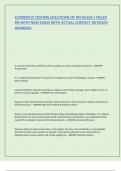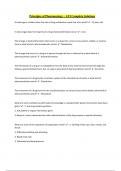CURRENTLY TESTING SOLUTIONS OF RN NCLEX / NCLEX
RN WITH NGN EXAM WITH ACTUAL CORRECT DETAILED
ANSWERS
Is a process of learning a different culture to adapt to a new or changing environment. - ANSWER-
Acculturation.
It is a subjective perspective of the person's heritage and a sense of belonging to a group - ANSWER-
Ethnic identity
Include meditation, relaxation techniques, imagery, music therapy, massage, touch, laughter, humor, &
spiritual measures (prayer). - ANSWER-Low-risk therapies:
Because of their health & dietary practices, Native Americans, Latino Americans, Hispanic Americans, &
African Americans. - ANSWER-High risk of obesity & diabetes mellitus
Surgery is not prohibited, but the administration of blood and blood products is forbidden. This religious
group believes the soul cannot live after death. Administration of medication is an acceptable practice
except if the medication is derived from blood products. - ANSWER-Jehovah's Witnesses
Believers adhere to dietary kosher laws. In this religion, the dairy-meat combination is unacceptable.
Only fish that have scales and fins are allowed; meats that are allowed include animals that are
vegetable eaters, cloven-hoofed, and ritually slaughtered. - ANSWER-Orthodox Judaism
,include whole medical systems, mind-body medicine, biologically based practices, manipulative & body-
based practices, & energy medicine. - ANSWER-Five categories of complementary and alternative
medicine (CAM):
Focused, maintains strong control, makes decisions, & addresses all problems. Dominates group &
commands, rather than seeks suggestions or input. Manager addresses problem (quality improvement)
with taff, designs a plan without input, & wants all problems reported directly back to her - ANSWER-
Autocratic leader
Participative & would likely meet with each staff person individually to determine staff member's
perception of problem. Would also speak with the staff about any issues & ask the staff for input with
developing a plan. - ANSWER-Democratic leader
Passive and nondirective. Would state what the problem was & inform staff that the staff needed to
come up with a plan to "fix it." - ANSWER-Laissez-faire leader
Assessment findings include cough, dyspnea, crackles, tachypnea, tachycardia, elevated blood pressure,
bounding pulse, elevated CVP, weight gain, edema, neck & hand vein distention, altered LOC, &
decreased hematocrit. - ANSWER-Overhydration or fluid overload & occurs when fluid intake or fluid
retention
Avocado, bananas, cantaloupe, carrots, fish, mushrooms, oranges, potatoes, pork, beef, veal, raisins,
spinach, strawberries, & tomatoes - ANSWER-Common food sources of potassium:
Muscle weakness, increased urinary output, & decreased specific gravity of the urine would be noted -
ANSWER-Hyponatremia
Causative factors relate to malnutrition or starvation & the use of aluminum hydroxide-based or
magnesium-based antacids. Malnutrition is associated with alcoholism. - ANSWER-Hypophosphatemia
Renal insufficiency, hypoparathyroidism, & tumor lysis syndrome; causative factors. Should avoid foods
high in phosphates; fish, eggs, milk products, vegetables, whole grains, & carbonated beverages. -
ANSWER-Hyperphosphatemia
,Vomiting, diarrhea, conditions that increased respiration's or increased urinary output, insufficient
intravenous fluid replacement, draining fistulas, presence of ileostomy or colostomy. Diuretics, &
gastrointestinal suctioning. - ANSWER-Causes of a fluid volume deficit
Decreased kidney function, heart failure, hypotonic fluids to replace isotonic fluid losses, excessive
irrigation of wounds & body cavities, & excessive ingestion of sodium. - ANSWER-Causes of
overhydration or fluid overload:
Trauma, burns, sepsis, or metabolic or respiratory acidosis. - ANSWER-Hyperkalemia causes:
Cushing's syndrome or colitis & over use of laxatives. - ANSWER-Hypokalemia causes:
Decreased pH & decreased HCO3. Occurs in kidney disease; diabetic ketoacidosis; high fat diet;
insufficient metabolism of carbohydrates; malnutrition; ingestion of toxins, such as acetylsalicylic acid
(aspirin); malnutrition; severe diarrhea. Intestinal secretion high in bicarbonate & may be lost through
enteric drainage tubes, an ileostomy, or diarrhea. - ANSWER-Metabolic acidotic
Nausea & vomiting. Loss of gastric acid, cause pH & HCO3 to increase. Symptoms experienced would
include hypoventilation & tachycardia. - ANSWER-Metabolic alkalosis
Decreased pH and an increased CO2. Hypoventalation & COPD - ANSWER-Respiratory acidotic
Increased pH & decreased CO2. Hyperventalation, Lethargy, lightheadedness, confusion, tachycardia,
dysrhythmias related to hypokalemia, nausea, vomiting, epigastric pain, numbness & tingling of
extremities. Hyperventilation (tachypnea) occurs. - ANSWER-Respiratory alkalotic
Sample for PT & INR level to determine anticoagulation status & risk for bleeding - ANSWER-Warfarin
(Coumadin)
aPTT monitors the effects. Anticoagulant used most often during hemodialysis. Monitors extent of
anticoagulation checking PTT, which is appropriate measure heparin effect. Protamine sulfate is antidote.
- ANSWER-Heparin
, Dark green leafy vegetables good source iron, oranges are a good source of vitamin C, which enhances
iron absorption. - ANSWER-Iron deficiency anemia foods in diet:
May lack B12 in diet. - ANSWER-Vegans
Include fruits & vegetables - ANSWER-Low sodium foods:
Highly processed or refined foods (tomato soup, instant oatmeal), Saltwater fish & shellfish. Smoked
foods, - ANSWER-High Sodium foods:
Water, bouillon, clear broth, carbonated beverages, gelatin, hard candy, lemonade, ice pops, and regular
or decaffeinated coffee or tea. - ANSWER-Clear liquid diet:
Pulling, Vegetable juice, Pureed vegetables, plain ice cream, sherbet, breakfast drinks, milk, pudding &
custard, soups that are strained, refined cooked cereals, & strained vegetable juices. - ANSWER-Full
liquid diet:
Pork products rich in this vitamin. Other good food sources include nuts, whole grain cereals, & legumes.
- ANSWER-High Thiamine foods
On the left side, with the head lower than the feet. This position used to minimize effect of air traveling
as a bolus to lungs by trapping it in right side of heart. - ANSWER-Suspects air embolism. Should
immediately place client in which position?
Assess for known allergies to eggs to prevent anaphylaxis. - ANSWER-Fat emulsion (lipids)
Signs include excessive thirst, fatigue, restlessness, confusion, weakness, Kussmaul's respirations,
diuresis, & coma when severe. If has these symptoms, blood glucose level should be checked
immediately. - ANSWER-Hyperglycemia:
Temperature and weight: Temperature monitored to detect infection, potential complication of therapy.
Infection also could result in sepsis because catheter in blood vessel. Weight monitored for effectiveness
nutritional therapy & detect hypervolemia. - ANSWER-Parenteral nutrition; PN monitor





